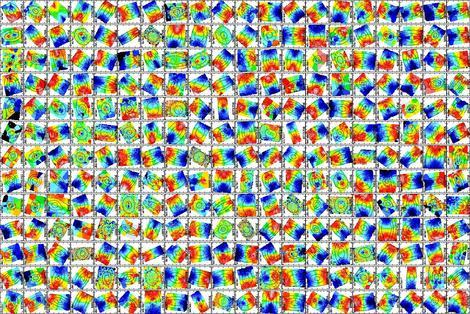The majority of ‘elliptical’ galaxies are not spherical but disc-shaped, resembling spiral galaxies such as our own Milky Way with the gas and dust removed, new observations suggest.
The results come from Atlas3D, a survey of all 260 early-type (‘elliptical’ and ‘lenticular’) galaxies in a well-defined volume of the nearby universe. Atlas3D shows a much closer link between ‘elliptical’ galaxies and spiral galaxies than previously thought. The findings are likely to change our ideas of how galaxies form and see astronomy text-books rewritten.
A report of the research, by the international Atlas3D team, is published in an upcoming issue of Monthly Notices of the Royal Astronomical Society.
‘Because we rely on optical images, up until now it has been very difficult to separate discs of stars seen face-on from rounder, spherical balls of stars seen edge-on,’ said Dr Michele Cappellari of Oxford University, a Royal Society Research Fellow who is the UK lead of the Atlas3D project. ‘But because stars in a thin disc rotate much faster than those in a spheroid, obtaining maps of stellar motions for all elliptical galaxies in the sample, we have shown that out of these 66% are disc-like.’
The findings suggest that the idea that galaxies can be clearly separated into two different ‘families’, spiral galaxies and elliptical galaxies, reflecting two distinct paths to galaxy formation, is inaccurate.
This ‘two families’ approach was famously visualised in Edwin Hubble’s ‘tuning fork’ diagram of 1936 in which elliptical nebulae, which consist of more spherical groups of stars, split off into two prongs of spiral galaxies (with and without bars). The Atlas3D results suggest that this tuning fork should be replaced with a ‘comb-like’ diagram where elliptical galaxies are parallel to spirals and linked to them along the teeth of the comb while only a few true ellipticals are separated into the handle.
‘According to our survey only a small fraction of elliptical galaxies, the ‘slow rotators’, are genuine spheroids. It reveals a strong family resemblance between elliptical and spiral galaxies once we can adjust for whether we are seeing them face-on or from the side,’ said Dr Cappellari. ‘This close relationship will need to be considered in any future models of how galaxies form. It’s an exciting moment, after four years of work in the project, we have the final piece of the puzzle which enables us to say that text-books used to teach astronomy for over 70 years now need to be revised.’
The team, led by Dr Michele Cappellari of Oxford University’s Department of Physics, Eric Emsellem, Davor Krajnovic (ESO, Germany) and Richard McDermid (Gemini, USA), compiled their maps of stellar motions from 40 nights of observations using the SAURON integral-field spectrograph at the 4.2-m William Hershel Telescope on the Canary Islands.
A report of the research is to be published in an upcoming issue of Monthly Notices of the Royal Astronomical Society. Lead author Dr Michele Cappellari was supported through a Royal Society Research Fellowship.



